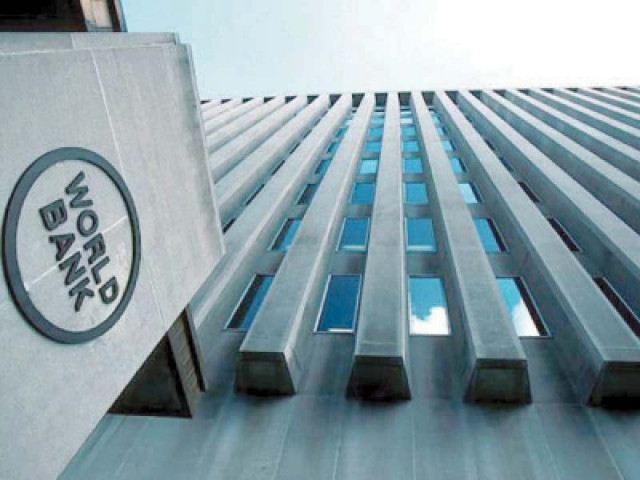World Bank holds release of $400m
Stops disbursement of loan due to delay in implementation of conditions

The World Bank has stopped the disbursement of a $400 million loan that Pakistan secured last month to build foreign exchange reserves but could not implement all the agreed conditions.
The World Bank has given a new three-month deadline to implement new additional conditions for releasing the money or else the loan pact will be terminated, showed an agreement signed by both the sides.
The main outstanding condition is the final approval of the Indicative Generation Capacity Expansion Plan (IGCEP), which also links nuclear-based power generation with either cost effectiveness or payment of subsidies by the government.
“The effectiveness deadline is 90 days after the signature date,” according to the agreement signed on June 29 by outgoing Economic Affairs Secretary Noor Ahmad and World Bank Acting Country Director Shabihul Mohib.
The Washington-based lender’s decision to put the release of the $400 million loan on hold underscores the challenges that the government will have to face until its ties with the International Monetary Fund (IMF) are fully revived.
On June 28, the World Bank board of directors had approved financing for two programmes - Pakistan Programme for Affordable and Clean Energy (PACE) and the second Securing Human Investments to Foster Transformation (SHIFT-II) - totalling $800 million.
However, the lender disbursed $400 million under the SHIFT programme but stopped the release for the second loan programme due to delay in implementing the conditions, government officials told The Express Tribune.
Finance Secretary Yousaf Khan did not comment.
The $400 million loan was pegged with increase in electricity tariffs, reduction in power subsidies, appointing private sector members on boards of power distribution companies and more importantly approval of the National Electricity Policy and IGCEP.
A spokesman for the State Bank of Pakistan said that the country had received $440 million from the World Bank.
The World Bank has set additional nearly half a dozen conditions for the loan disbursement and some of them were implemented by calling a meeting of the Council of Common Interests (CCI).
The loan agreement showed that the World Bank would release the funds only if the “bank is satisfied with the progress achieved by the borrower in carrying out the programme and with the adequacy of the borrower’s macroeconomic policy framework”.
The World Bank’s country office decision to dispatch the $800 million loan documents for board approval surprised many since talks between Pakistan and the IMF had collapsed for the approval of sixth review and release of $1 billion.
The inclusion of the additional loan effectiveness conditions like satisfaction over macroeconomic policies seems an afterthought in this case.
The Pakistan Tehreek-e-Insaf (PTI), like its predecessor, has been building foreign exchange reserves by taking new loans, including through the Roshan Digital Account by paying up to 7% interest rate in dollar terms.
Pakistani rupee has also come under pressure since talks between the IMF and Pakistan ended inconclusively last month. The rupee depreciated to Rs159.33 to a dollar on Thursday.
The CCI’s approval of the updated National Electricity Policy and the cabinet’s endorsement of steps for increasing private participation in the management of government-owned distribution companies were also part of the additional set of conditions.
Pakistan has not yet implemented the most crucial and strategically sensitive condition that the National Electric Power Regulatory Authority (Nepra) will approve “a least cost generation plan based on criteria approved by the cabinet”.
Section 5.1.4 of IGCEP says “the nuclear generation capacity additions shall be incorporated in the IGCEP on the basis of cross-sectoral decisions by way of consultative process, taking into account economics of generation, resultant tariff and demand of the sector”.
Moreover, expansion in generation capacity shall be only on competitive and least cost basis (except for strategic projects, for which (a) the qualification and methodology shall be provided in the National Electricity Plan and (b) the federal government shall approve such projects on case-to-case basis.
For projects that do not qualify as strategic, any procurement beyond the least cost principle shall be subject to the provisioning of subsidy by the government/provincial government (to the extent of incremental cost of such projects beyond least cost).
The loan document showed that the World Bank had charged a front-end fee of $500,000 of the loan amount and another 0.25% would be charged as commitment charge every year on the un-withdrawn loan balance over and above the standard interest rates.
For qualifying for the $400 million loan, the government has already increased electricity tariffs by Rs1.95 per unit and prepared a circular debt reduction plan that also seeks up to Rs7-per-unit increase in prices.
Under the same plan, Nepra has already approved Rs2.97-per-unit increase in electricity prices.
As part of the PACE loan condition, the government has already notified reduced capacity charges for government-owned generation plants, decided to end supply of subsidised natural gas to industries producing their own power, except those plants using gas for other industrial purpose.
The cabinet has approved a phased retargeting of electricity subsidies that protects poor households but reduces subsidies for remaining consumers; and a revised electricity tariff structure under which users below 200 units per month for six consecutive months are fully or partially protected from tariff increase.
Published in The Express Tribune, July 9th, 2021.
Like Business on Facebook, follow @TribuneBiz on Twitter to stay informed and join in the conversation.



















COMMENTS
Comments are moderated and generally will be posted if they are on-topic and not abusive.
For more information, please see our Comments FAQ